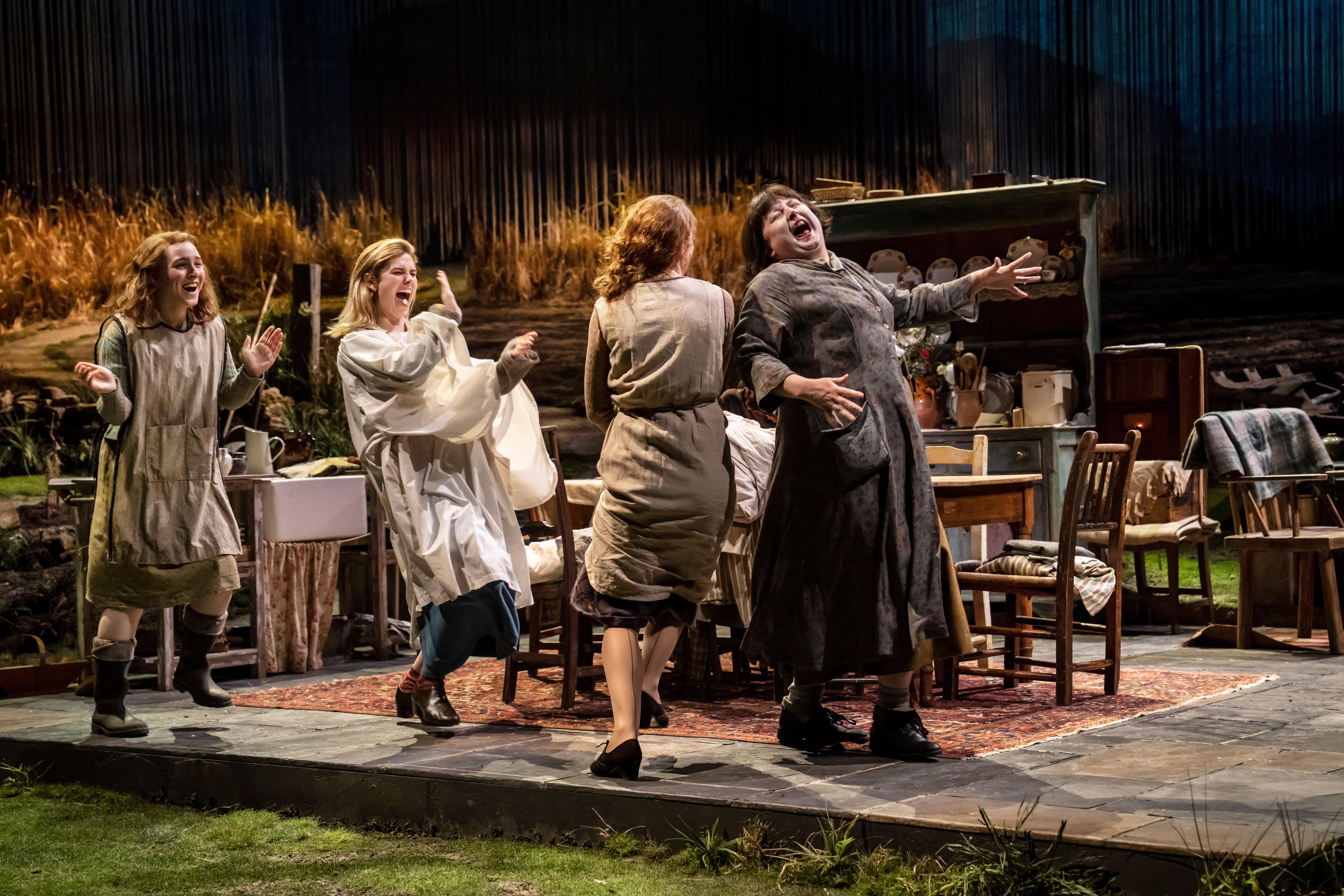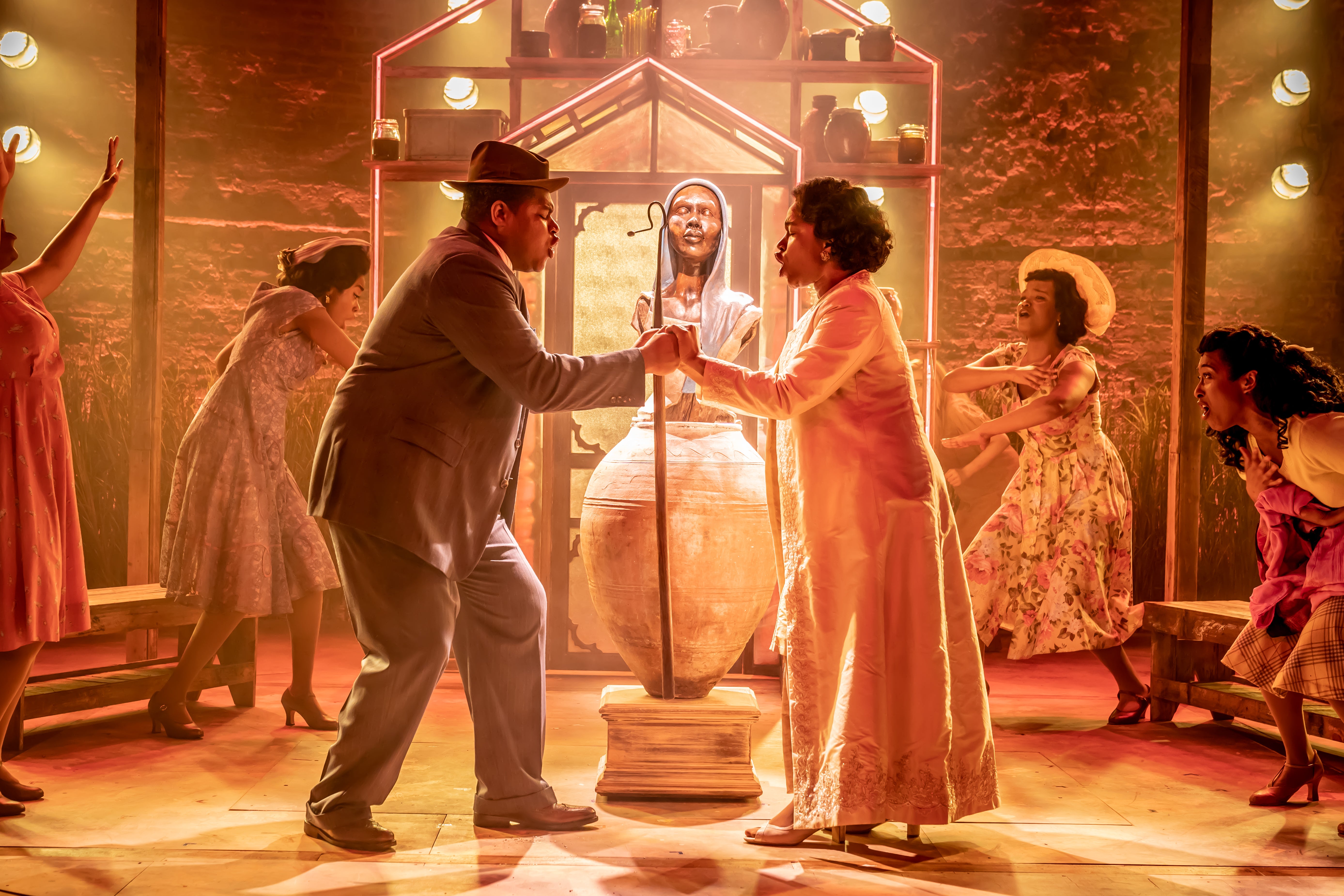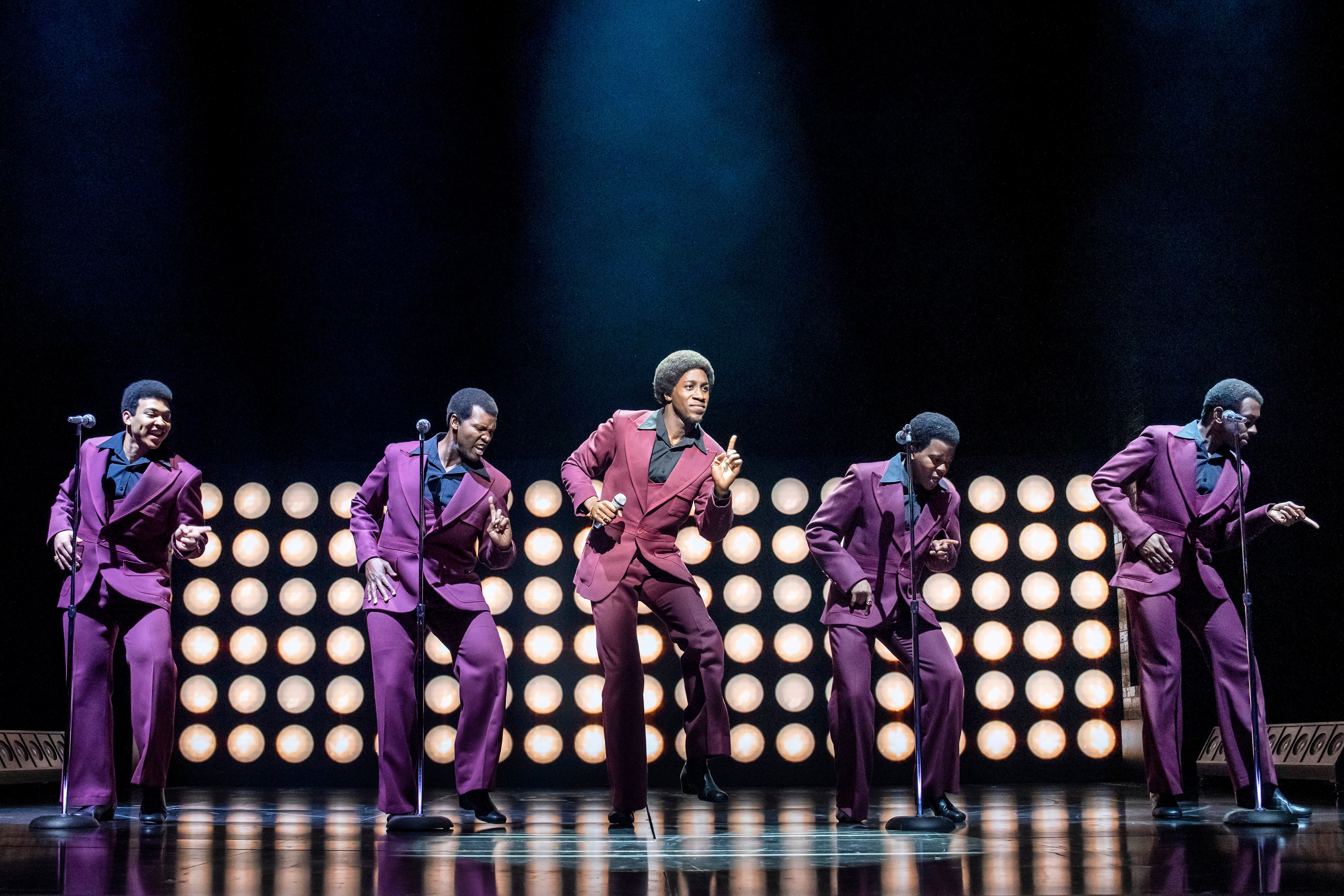
This week, a major Brian Friel revival opens at the National Theatre, a popular novel gets the stage treatment at the Almeida and a new jukebox musical opens in the West End.
Dancing at Lughnasa – National Theatre ★★★☆☆
With an impressive cast of Irish talent – including not one, but two Derry Girls stars – Josie Rourke’s revival of Brian Friel’s memory play cleverly manages to evoke the quality of memory itself. We’re transported back to the hazy summer of 1936, to the fictional town of Ballybeg. In a small cottage live five unmarried sisters, in a world that doesn’t know what to do with them. They sit, cook, knit and reminisce about old days and old flirtations. They reside with their older brother, Jack (Ardal O’Hanlon), who has returned from missionary work in Uganda with some unusual new ideas. And then there’s Michael, the young son of middle sister Chris (Alison Oliver). His adult self (Tom Vaughan-Lawlor) looks back and narrates the story of the summer that everything changed.

Despite the epic scale and beauty of Michael Jones’s set, the opening moments feels surprisingly understated. Adult Michael sets the scene with slow-paced, lengthy monologues, but it’s the women’s world that we clamour to see. This is a matriarchy within a patriarchy, where sisters weave around one another in the kitchen as they make tea and nuzzle each other’s necks in affection. They live in poverty, but their love for one another is clear. In the moments that they allow themselves to feel joy, dancing around their humble home, the stage glows – Louisa Harland, in particular, has a lightness on her feet befitting a prima ballerina. There’s a heavy sense of realism, even if the narrative of the “poor but happy” family can sometimes feel cloying.
There’s gentle humour in Friel’s script, pushed to its fullest potential by the older sisters of the family. Siobhán McSweeney’s defiant, cheeky Maggie brings joy to the production, every eye-roll a work of art. Yet it is Justine Mitchell as the highly strung Kate who really steals the show, as she rants about paganism and looks ready to faint at any moment. When Michael looks back at his life, it’s the women he remembers – and in Rourke’s production, they’re what we remember too. The women and the dancing. Isobel Lewis
The Secret Life of Bees – Almeida Theatre ★★★★☆
On the turn of the season, a new musical arrives that makes the air feel fresh. The Secret Life of Bees feels like a new kind of crowd-pleaser: joyful and inclusive. Based on Sue Monk Kidd’s 2001 novel, later made into a 2008 film, starring Dakota Fanning and Queen Latifah, it turns a coming-of-age narrative into more of a quest story: the search for acceptance, a home and a better world, in a landscape blighted by racism and misogyny.

It is 1964, in South Carolina. People fan themselves with the heat; President Johnson has just signed the Civil Rights Act. In Whitney White’s gripping production, a news reporter forebodingly informs us that “local activists vow to test the new provisions”. Motherless white teenager Lily (Eleanor Worthington-Cox) ends up on the run from her abusive father, looking for safety with the family’s Black maid Rosaleen (Abiona Omonua), who has been violently beaten while on her way to vote. A postcard of a Black Madonna, left by Lily’s mother, leads them to the Boatwright family’s honey farm, where the image adorns the jars. Matriarch August (Rachel John) welcomes them, alongside her sisters May and June, who are overcoming their own traumas.
The novel is plotty, but Lynn Nottage’s book makes some smart tweaks, altering aspects that could have jarred, and emphasising the political context. But the truest pleasure is Duncan Sheik’s score, with lyrics by Sue Birkenhead, and how gorgeously it is sung by this cast. Folksy, bluesy and soulful, it gives each character their moment. As a new musical in a theatre landscape that yearns for some confident, unrecycled storytelling, The Secret Life of Bees stands out. Not every note is met: the title song is slightly odd, and some of the dramatic scenes between songs land a little clunkily. If I were being cynical, I might say that the Boatwrights – August in particular – strays close to the “magical negro” trope, popularised by Spike Lee to describe Black characters with spiritual insights, selflessly helping white protagonists. But there is something beautiful here in the sense that, although survival can be singular, stepping forward is often something we must do together. From the moment that Lily and Rosaleen join hands and set out on their search for a place that accepts them, I fell a bit in love with this show. Jessie Thompson
Ain’t Too Proud – Prince Edward Theatre ★★★★☆
Jukebox musicals often face the obstacle of leaving a good plot to the wayside in service of a specific music catalogue. With Ain’t Too Proud, the discography of the Temptations, which includes glorious songs from “Get Ready” to “Papa was a Rollin’ Stone” is clearly the main event. Fortunately, both thoughtful characterisation and dazzling choreography bring the 60-year-old band’s story to complete life.
Since they began in 1960, the Temptations have racked up tens of millions of album sales. The band, known for their sweet harmonies, are considered foundational figures of American pop music. Most of the action in writer Dominique Rousseau’s show concerns itself with the classic chapter of the Temptations lineup, during the Sixties. Today, founder Otis Williams remains the sole surviving member of the original group. It makes sense, then, that Williams (Sifiso Mazibuko) is our storyteller for the night, as we track the highs, lows and happy mediums of the trailblazing R&B band, still active today.

As Williams, Mazibuko is a warm and reliable central figure. However, Tosh Wanogho-Maud steals the stage with his charismatic portrayal of cocky band showman David Ruffin, complete with a stunning voice, belting away on the band’s big hits. As the optimistic, light-footed Paul Williams and the sweet-voiced charmer Eddie Kendricks respectively, Kyle Cox and Mitchell Zhangazha are delightful, while a suave and confident Cameron Bernard Jones completes the quintet as bass singer Melvin Franklin.
It’s easy to see why Sergio Trujillo’s choreography picked up a Tony during the musical’s run on Broadway – the "Temps", as well as acts such as the Supremes (also briefly featured), move in unison with complete, thrilling precision. Audience etiquette has recently been under the spotlight, and you can almost feel people wanting to join in when karaoke-friendly hits like “My Girl” and “What Becomes of the Brokenhearted” begin. Aware of that urge, the cast indicate clearly when it’s okay for the audience to follow their impulses and help with the occasional chorus. It may not reinvent the wheel, but Ain’t Too Proud is an undeniably cheerful show, full of songs that move and inspire, decades after their birth. Nicole Vassell







